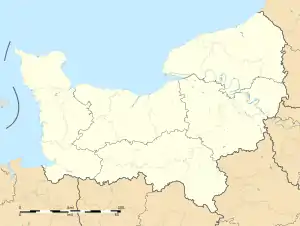Mortemer | |
|---|---|
Location of Mortemer | |
 Mortemer  Mortemer | |
| Coordinates: 49°45′06″N 1°33′04″E / 49.7517°N 1.5511°E | |
| Country | France |
| Region | Normandy |
| Department | Seine-Maritime |
| Arrondissement | Dieppe |
| Canton | Neufchâtel-en-Bray |
| Intercommunality | CC Bray-Eawy |
| Government | |
| • Mayor (2020–2026) | Daniel Van Hulle[1] |
| Area 1 | 8.94 km2 (3.45 sq mi) |
| Population | 87 |
| • Density | 9.7/km2 (25/sq mi) |
| Time zone | UTC+01:00 (CET) |
| • Summer (DST) | UTC+02:00 (CEST) |
| INSEE/Postal code | 76454 /76270 |
| Elevation | 128–230 m (420–755 ft) (avg. 151 m or 495 ft) |
| 1 French Land Register data, which excludes lakes, ponds, glaciers > 1 km2 (0.386 sq mi or 247 acres) and river estuaries. | |
Mortemer is a commune in the Seine-Maritime department in the Normandy region in northern France.
Geography
Mortemer is a small forestry and farming village situated in the valley of the river Eaulne in the Pays de Bray, some 23 miles (37 km) southeast of Dieppe at the junction of the D7, D36 and the D929 roads. The A29 autoroute passes through the territory of the commune.
History
It was the site of the battle of Mortemer in February 1054 and was a defeat for Henry I of France when he led an army against his vassal, William the Bastard, Duke of Normandy in 1054.
This village is possibly the source of the medieval family name of Mortimer. The nature of the family's relations confused Robert of Torigni, one of the authors of the Gesta Normannorum Ducum. He claims that Roger of Mortemer was the brother of "William, later to be Earl of Surrey". But possibly Robert missed out a generation, as he did in dealing with the family history of the Montgomerys.[3]
Population
| Year | Pop. | ±% p.a. |
|---|---|---|
| 1968 | 139 | — |
| 1975 | 110 | −3.29% |
| 1982 | 124 | +1.73% |
| 1990 | 121 | −0.31% |
| 1999 | 107 | −1.36% |
| 2007 | 108 | +0.12% |
| 2012 | 96 | −2.33% |
| 2017 | 83 | −2.87% |
| Source: INSEE[4] | ||
Places of interest
- The church of St. Martin, dating from the eighteenth century.
- Ruins of a twelfth-century Cistercian abbey.
- Ruins of the donjon of the twelfth-century castle.
See also
References
- ↑ "Répertoire national des élus: les maires" (in French). data.gouv.fr, Plateforme ouverte des données publiques françaises. 13 September 2022.
- ↑ "Populations légales 2021". The National Institute of Statistics and Economic Studies. 28 December 2023.
- ↑ The Gesta Normannorum Ducum of William of Jumièges and Robert of Torigni, edited and translated by M. C. Van Houts, Clarendon Press Oxford, 1995.
- ↑ Population en historique depuis 1968, INSEE